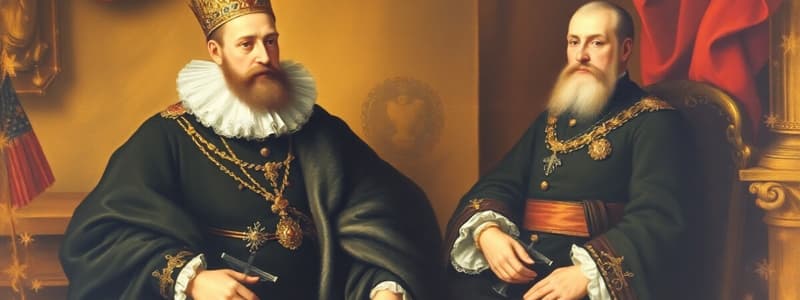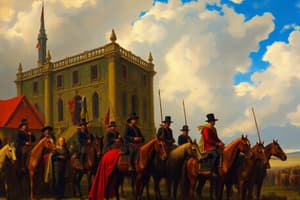Podcast
Questions and Answers
¿Cuál fue la principal razón por la que Inglaterra retiró su apoyo a Carlos de Habsburgo durante la Guerra de Sucesión Española?
¿Cuál fue la principal razón por la que Inglaterra retiró su apoyo a Carlos de Habsburgo durante la Guerra de Sucesión Española?
- Inglaterra llegó a un acuerdo secreto con Francia para dividir el territorio español.
- Carlos de Habsburgo se negó a ceder territorios a Inglaterra a cambio de su apoyo.
- Carlos de Habsburgo heredó el Imperio Austriaco, lo que, de haber asumido también el trono español, rompería el equilibrio de poder en Europa. (correct)
- Inglaterra consideró que Carlos no tenía posibilidades reales de ganar la guerra.
¿Qué dinastía reemplazó a los Habsburgo en el trono español?
¿Qué dinastía reemplazó a los Habsburgo en el trono español?
- Los Austrias
- Los Tudor
- Los Borbones (correct)
- Los Trastámara
¿Cuál fue el impacto principal del Tratado de Utrech en España?
¿Cuál fue el impacto principal del Tratado de Utrech en España?
- Confirmó la anexión de Portugal a España.
- Estableció una alianza militar duradera entre España y Austria.
- Consolidó el poderío marítimo español en América.
- Forzó a España a hacer concesiones a potencias rivales, como el permiso a Inglaterra para comerciar con sus colonias. (correct)
A la muerte de qué rey español asciende Felipe V al trono?
A la muerte de qué rey español asciende Felipe V al trono?
¿Qué territorios formaron la llamada Gran Alianza de la Haya?
¿Qué territorios formaron la llamada Gran Alianza de la Haya?
¿Qué monarca centró su reinado en mantener la paz con Francia e Inglaterra?
¿Qué monarca centró su reinado en mantener la paz con Francia e Inglaterra?
¿Qué grupo se opuso a Felipe V al ascender al trono español?
¿Qué grupo se opuso a Felipe V al ascender al trono español?
¿Que implicaciones tuvo para España el hecho de que Carlos de Habsburgo heredara el imperio austriaco?
¿Que implicaciones tuvo para España el hecho de que Carlos de Habsburgo heredara el imperio austriaco?
¿Cómo describirías el reinado de Carlos II en España?
¿Cómo describirías el reinado de Carlos II en España?
¿Qué tipo de transformaciones importantes se produjeron en España durante el reinado de Carlos III?
¿Qué tipo de transformaciones importantes se produjeron en España durante el reinado de Carlos III?
Flashcards
Carlos II of Spain
Carlos II of Spain
King of Spain, son of Felipe IV, began ruling in 1675. His reign marked Spain's decline.
Felipe de Anjou
Felipe de Anjou
Named successor by Carlos II; became Felipe V, establishing the Bourbon dynasty in Spain.
Catalan Opposition
Catalan Opposition
Catalan group opposing Felipe V, supported Archduke Carlos of Habsburg.
Gran Alianza de la Haya
Gran Alianza de la Haya
Signup and view all the flashcards
Carlos of Habsburg
Carlos of Habsburg
Signup and view all the flashcards
Treaty of Utrecht (1713)
Treaty of Utrecht (1713)
Signup and view all the flashcards
Post-War Agreement
Post-War Agreement
Signup and view all the flashcards
Fernando VI's Reign
Fernando VI's Reign
Signup and view all the flashcards
Carlos III's Reign
Carlos III's Reign
Signup and view all the flashcards
Study Notes
- Carlos II of Spain (born in 1661) was the son of King Felipe IV and Mariana of Austria.
- Carlos II became orphaned at four years old and remained under his mother's regency until 1675, when he became king.
- The reign of Carlos II was characterized by the decline of Spain.
- Before Carlos II died in 1700, he named Felipe de Anjou, grandson of Louis XIV of France and great-grandson of Felipe IV of Spain, as his successor since he had no descendants.
- Felipe de Anjou renounced his aspiration to the French throne and became Felipe V of Spain, ending the Habsburg dynasty and ascending the Bourbon dynasty to the Spanish throne.
- After Felipe V of Spain was crowned, a group in Catalonia opposed the designation of the new king and supported Archduke Carlos of Habsburg.
- This discontent led to the formation of the Grand Alliance of The Hague, which included England, the Netherlands (present-day Holland), and Denmark.
- Austria, England, and the Netherlands decided to support the Austrian candidate, being direct rivals of France and Spain, particularly in maritime control.
- A war was fought in both Spain and Europe, until 1704
- In 1711, during the war, Carlos de Habsburgo inherited the Austrian Empire, which discouraged his allies from supporting him.
- The possibility of Carlos ruling both the Austrian and Spanish crowns deterred support, particularly from England.
- It could have made Carlos the most powerful sovereign in Europe and upset the continent's balance of power.
- This issue expedited the war's end, which was sealed by the Treaty of Utrecht in 1713, and despite internal revolts in Spain, the Bourbon dynasty would establish itself permanently.
- The peace agreement by European powers mainly disadvantaged Spain, as Spain had to concede to its Austrian and English rivals.
- One key concession was the permission for the English to trade with its colonies in America.
- After Felipe V died in 1746, his son Fernando VI was crowned and his reign largely focused on maintaining peace with France and England.
- Fernando VI also made strides in unifying Spanish territories, including those who opposed Felipe V's designation.
- The rise of the Bourbons prompted significant changes in Spain during the reign of Carlos III, which led to a profound transformation across the Spanish Empire.
Studying That Suits You
Use AI to generate personalized quizzes and flashcards to suit your learning preferences.





